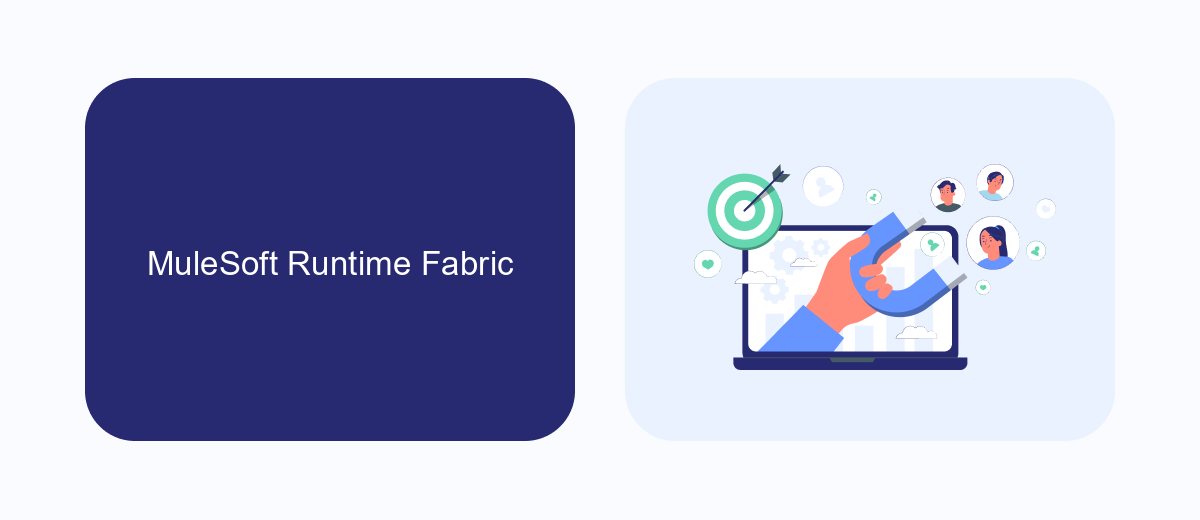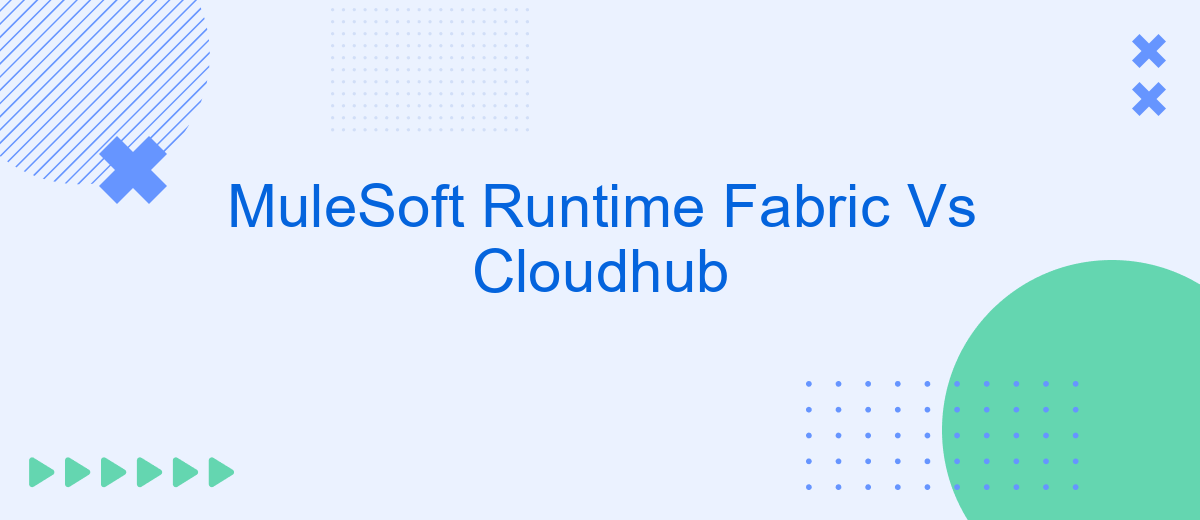In the ever-evolving landscape of integration platforms, MuleSoft offers two powerful deployment options: Runtime Fabric and CloudHub. Each has its own unique set of features and benefits, designed to meet diverse business needs. This article delves into a comparative analysis of MuleSoft Runtime Fabric and CloudHub, helping you determine which solution aligns best with your organization's objectives.
Introduction
When considering integration platforms for your business, MuleSoft Runtime Fabric and CloudHub are two prominent options. Both platforms offer robust solutions for deploying and managing APIs and integrations, but they cater to different needs and use cases.
- MuleSoft Runtime Fabric: A container service that allows you to deploy Mule applications on any cloud or on-premises environment.
- CloudHub: A fully managed, multi-tenant, and cloud-based integration platform as a service (iPaaS).
Choosing between MuleSoft Runtime Fabric and CloudHub depends on various factors such as deployment preferences, scalability requirements, and management capabilities. Additionally, tools like SaveMyLeads can further streamline your integration processes, offering pre-built connectors and automation features to simplify data flow between various applications.
MuleSoft Runtime Fabric

MuleSoft Runtime Fabric is a container service that allows you to deploy and manage Mule applications across various environments, including on-premises data centers, private clouds, and public clouds. It provides a flexible and scalable infrastructure that supports high availability and disaster recovery, ensuring that your applications run smoothly and reliably. Runtime Fabric simplifies the deployment process by automating the provisioning of resources and managing the underlying infrastructure, allowing developers to focus on building and improving their applications.
One of the key benefits of MuleSoft Runtime Fabric is its ability to integrate seamlessly with various services and platforms. For instance, it can work in conjunction with SaveMyLeads, a service that automates the integration of various applications and services. This integration capability allows businesses to streamline their workflows and improve efficiency by automating data transfers and other repetitive tasks. By leveraging MuleSoft Runtime Fabric and services like SaveMyLeads, organizations can achieve a more connected and efficient operational environment.
MuleSoft CloudHub

MuleSoft CloudHub is a fully managed integration platform as a service (iPaaS) that enables businesses to connect applications, data, and devices with ease. It is designed to simplify the integration process, providing a robust and scalable environment for deploying APIs and integrations. CloudHub offers a range of features that make it an ideal choice for enterprises looking to streamline their integration efforts.
- Scalability: CloudHub automatically scales to handle varying loads, ensuring optimal performance at all times.
- High Availability: With built-in redundancy and failover capabilities, CloudHub ensures that integrations remain operational even in the event of hardware failures.
- Security: CloudHub provides enterprise-grade security features, including data encryption and secure access controls.
- Monitoring and Analytics: Comprehensive monitoring and analytics tools help businesses gain insights into their integration processes.
- SaveMyLeads Integration: CloudHub supports seamless integration with services like SaveMyLeads, which automates the process of connecting various applications and platforms, further enhancing productivity.
By leveraging MuleSoft CloudHub, organizations can significantly reduce the time and effort required to integrate disparate systems. Its robust feature set and ease of use make it an excellent choice for businesses of all sizes looking to improve their integration capabilities and drive digital transformation.
Comparison

MuleSoft Runtime Fabric and CloudHub are two powerful solutions for deploying and managing Mule applications, but they offer different features and benefits. MuleSoft Runtime Fabric provides a container-based service that allows you to deploy Mule applications on any infrastructure—whether it's on-premises, in the cloud, or in a hybrid environment. On the other hand, CloudHub is MuleSoft's fully managed, multi-tenant integration platform as a service (iPaaS) that simplifies the deployment and management of Mule applications in the cloud.
When comparing these two options, it's important to consider your organization's specific needs and infrastructure. Runtime Fabric offers greater flexibility and control, while CloudHub provides ease of use and scalability. Both platforms integrate seamlessly with MuleSoft's Anypoint Platform, ensuring robust API management and connectivity.
- Deployment Flexibility: Runtime Fabric supports multiple deployment environments, whereas CloudHub is cloud-only.
- Management: CloudHub offers a fully managed service, reducing the operational burden, while Runtime Fabric requires more hands-on management.
- Scalability: CloudHub automatically scales applications based on demand, whereas Runtime Fabric offers customizable scaling options.
- Integration: Both platforms can integrate with services like SaveMyLeads to automate and streamline your workflow processes.
Ultimately, the choice between MuleSoft Runtime Fabric and CloudHub depends on your organization's specific requirements, including deployment preferences, management capabilities, and scalability needs. Both platforms offer robust features to support your integration projects, ensuring seamless connectivity and efficient operations.
Conclusion
In conclusion, both MuleSoft Runtime Fabric and CloudHub offer robust solutions for managing and deploying integrations, each with its own set of advantages. Runtime Fabric provides a flexible, on-premise or hybrid cloud environment, ideal for organizations that require greater control over their infrastructure. On the other hand, CloudHub offers a fully managed, cloud-native experience, perfect for businesses looking to leverage the scalability and ease of use that comes with a cloud-based platform.
Choosing between these two options depends largely on your organization's specific needs and existing infrastructure. For those looking to simplify the integration process even further, services like SaveMyLeads can be invaluable. SaveMyLeads automates lead processing and integrates seamlessly with various platforms, making it easier to manage and optimize your workflows. Ultimately, understanding your unique requirements and leveraging the right tools will ensure a successful integration strategy.
- Automate the work with leads from the Facebook advertising account
- Empower with integrations and instant transfer of leads
- Don't spend money on developers or integrators
- Save time by automating routine tasks
FAQ
What is the primary difference between MuleSoft Runtime Fabric and CloudHub?
Can I use MuleSoft Runtime Fabric for hybrid deployments?
How does CloudHub handle scalability?
What are the key benefits of using MuleSoft Runtime Fabric?
Can I integrate third-party services with MuleSoft platforms?
Are you using Facebook Lead Ads? Then you will surely appreciate our service. The SaveMyLeads online connector is a simple and affordable tool that anyone can use to set up integrations for Facebook. Please note that you do not need to code or learn special technologies. Just register on our website and create the necessary integration through the web interface. Connect your advertising account with various services and applications. Integrations are configured in just 5-10 minutes, and in the long run they will save you an impressive amount of time.

